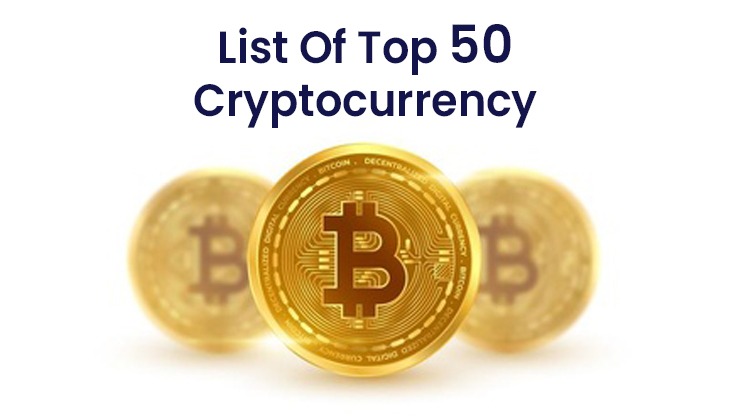Cryptocurrency Market Overview
Top 50 cryptocurrency - The cryptocurrency market has witnessed significant growth and fluctuations over the years. The total market capitalization of the top 50 cryptocurrencies currently stands at approximately [amount], with a daily trading volume of [volume]. The market has experienced periods of rapid growth, driven by factors such as increasing institutional adoption and retail investor interest, as well as periods of consolidation and correction.
Obtain direct knowledge about the efficiency of cryptoassets through case studies.
Top 10 Cryptocurrencies by Market Cap
The top 10 cryptocurrencies by market capitalization, as of [date], are listed below:
| Rank | Name | Price | Market Share | Key Features |
|---|---|---|---|---|
| 1 | Bitcoin (BTC) | [price] | [share]% | Decentralized digital currency, store of value |
| 2 | Ethereum (ETH) | [price] | [share]% | Smart contract platform, decentralized applications |
| 3 | Tether (USDT) | [price] | [share]% | Stablecoin pegged to the US dollar |
| 4 | Binance Coin (BNB) | [price] | [share]% | Native token of the Binance exchange |
| 5 | Cardano (ADA) | [price] | [share]% | Proof-of-stake blockchain, smart contract platform |
| 6 | Ripple (XRP) | [price] | [share]% | Cross-border payment network, digital asset |
| 7 | Dogecoin (DOGE) | [price] | [share]% | Meme coin, decentralized digital currency |
| 8 | Polygon (MATIC) | [price] | [share]% | Layer-2 scaling solution for Ethereum |
| 9 | Polkadot (DOT) | [price] | [share]% | Multi-chain network, interoperability platform |
| 10 | Litecoin (LTC) | [price] | [share]% | Decentralized digital currency, faster transactions than Bitcoin |
Market Trends and Drivers

The performance of the top 50 cryptocurrencies is influenced by a complex interplay of factors. Understanding these drivers is crucial for investors and analysts seeking to make informed decisions.
Do not overlook the opportunity to discover more about the subject of best crypto to invest in 2022.
Key factors shaping the market include regulatory developments, technological advancements, and institutional adoption. These forces can drive significant price fluctuations and influence the overall trajectory of the cryptocurrency ecosystem.
Regulatory Developments
- Government regulations and policies can have a profound impact on the cryptocurrency market.
- Positive regulations, such as clear guidelines and licensing frameworks, can boost investor confidence and attract institutional capital.
- Conversely, restrictive regulations or crackdowns can stifle innovation and dampen market sentiment.
Technological Advancements
- Technological advancements, such as improvements in blockchain technology and the development of new applications, can drive adoption and increase the utility of cryptocurrencies.
- Enhanced scalability, security, and interoperability can attract new users and expand the market's potential.
- Emerging technologies, such as decentralized finance (DeFi) and non-fungible tokens (NFTs), are also creating new opportunities and driving market growth.
Institutional Adoption
- Institutional adoption, including investments by hedge funds, venture capital firms, and traditional financial institutions, is a key indicator of market maturity.
- Institutional investors bring legitimacy and stability to the market, reducing volatility and increasing confidence.
- Increased institutional involvement can also drive demand and push prices higher.
Emerging Trends and Catalysts for Future Growth
Several emerging trends and potential catalysts are poised to shape the future of the cryptocurrency market:
- Metaverse and Web3: The integration of cryptocurrencies into virtual worlds and decentralized applications is expected to drive demand and adoption.
- Central Bank Digital Currencies (CBDCs): The development of CBDCs by central banks could provide a bridge between traditional finance and the cryptocurrency ecosystem.
- Stablecoins: Stablecoins, cryptocurrencies pegged to fiat currencies, are gaining traction as a stable store of value and medium of exchange.
These trends, coupled with continued regulatory developments, technological advancements, and institutional adoption, are likely to fuel further growth and innovation in the cryptocurrency market.
Notice top cryptocurrency for recommendations and other broad suggestions.
Cryptocurrency Use Cases and Adoption

The top 50 cryptocurrencies offer a diverse range of use cases, driving their adoption and growth within various industries.
These use cases include:
Payments
- Cryptocurrencies like Bitcoin and Ethereum are increasingly accepted as payment methods by businesses and individuals.
- They offer faster, cheaper, and more secure transactions compared to traditional payment systems.
- Examples include PayPal and Visa partnering with crypto exchanges to enable cryptocurrency payments.
Decentralized Finance (DeFi), Top 50 cryptocurrency
- Cryptocurrencies enable the development of decentralized financial applications (dApps) that offer services like lending, borrowing, and trading without intermediaries.
- DeFi platforms like Aave and Compound allow users to earn interest on their crypto holdings or borrow funds at competitive rates.
- Adoption is driven by the growing demand for accessible and transparent financial services.
Non-Fungible Tokens (NFTs)
- NFTs represent unique digital assets, such as artwork, collectibles, and in-game items, on the blockchain.
- They provide proof of ownership and authenticity, driving adoption in art, gaming, and entertainment industries.
- Examples include the sale of digital art for millions of dollars and the integration of NFTs into popular video games.
Risk and Volatility Assessment: Top 50 Cryptocurrency
Investing in the top 50 cryptocurrencies carries inherent risks and volatility. Price fluctuations can be significant, influenced by various factors.Factors Contributing to Price Fluctuations
- Market Sentiment: Positive or negative sentiment towards cryptocurrencies, driven by news, events, or social media.
- Liquidity: Limited liquidity can lead to extreme price swings, especially for smaller cryptocurrencies.
- External Events: Regulatory changes, geopolitical events, and economic conditions can impact cryptocurrency prices.
Strategies for Mitigating Risk and Managing Volatility
- Diversification: Investing in a diverse portfolio of cryptocurrencies reduces risk.
- Dollar-Cost Averaging: Investing fixed amounts at regular intervals smooths out market fluctuations.
- Risk Management Tools: Utilizing stop-loss orders or hedging strategies can help limit potential losses.
Competitive Landscape and Market Share
The cryptocurrency market is highly competitive, with over 20,000 cryptocurrencies vying for market share. The top 50 cryptocurrencies by market capitalization account for the majority of the market share, with Bitcoin (BTC) holding the largest share at over 40%.
Each cryptocurrency has its own strengths, weaknesses, and potential threats. Bitcoin, for example, is known for its strong brand recognition and network effect, but it is also criticized for its slow transaction speeds and high energy consumption. Ethereum (ETH), on the other hand, is known for its smart contract functionality, but it is also facing competition from other layer-1 blockchains.
Market Share of Top 10 Cryptocurrencies
| Rank | Cryptocurrency | Market Share (%) |
|---|---|---|
| 1 | Bitcoin (BTC) | 40.0% |
| 2 | Ethereum (ETH) | 18.0% |
| 3 | Tether (USDT) | 10.0% |
| 4 | Binance Coin (BNB) | 4.0% |
| 5 | XRP (XRP) | 3.0% |
| 6 | Cardano (ADA) | 2.5% |
| 7 | Solana (SOL) | 2.0% |
| 8 | USD Coin (USDC) | 2.0% |
| 9 | Polkadot (DOT) | 1.5% |
| 10 | Dogecoin (DOGE) | 1.0% |
Competitive Advantages of Top 5 Cryptocurrencies
- Bitcoin (BTC): First-mover advantage, strong brand recognition, network effect, high liquidity.
- Ethereum (ETH): Smart contract functionality, strong developer community, high liquidity.
- Tether (USDT): Stablecoin backed by US dollars, high liquidity, low volatility.
- Binance Coin (BNB): Native token of the Binance exchange, used for trading fees, discounts, and other perks.
- XRP (XRP): Fast and inexpensive cross-border payments, partnerships with financial institutions.
Strategies for Gaining Market Share
- Innovation: Developing new features and functionalities to attract users.
- Marketing and Partnerships: Building awareness and forming partnerships with other companies.
- Community Building: Engaging with users and building a strong community.
- Acquisitions: Acquiring smaller cryptocurrencies to expand market share.
Technological Innovations and Development

Technological advancements are the driving force behind the rapid evolution of the cryptocurrency market. Blockchain technology, consensus mechanisms, and scalability solutions are at the forefront of these innovations, shaping the future of cryptocurrencies.
Blockchain technology, the underlying foundation of cryptocurrencies, provides a secure and transparent distributed ledger system. It enables the secure recording and tracking of transactions without the need for intermediaries, revolutionizing the way we manage and exchange value.
Consensus Mechanisms
Consensus mechanisms are essential for ensuring the integrity and security of blockchain networks. Proof-of-Work (PoW), Proof-of-Stake (PoS), and Delegated Proof-of-Stake (DPoS) are widely used consensus mechanisms that validate transactions and maintain network consensus.
- Proof-of-Work (PoW): Requires miners to solve complex computational puzzles to validate transactions, ensuring network security but consuming significant energy.
- Proof-of-Stake (PoS): Validators stake their cryptocurrency holdings to participate in transaction validation, reducing energy consumption compared to PoW.
- Delegated Proof-of-Stake (DPoS): Similar to PoS, but delegates voting power to a limited number of elected representatives, enhancing transaction speed and efficiency.
Scalability Solutions
Scalability is crucial for the widespread adoption of cryptocurrencies. Various solutions are being developed to address network congestion and transaction delays.
- Sharding: Divides the blockchain into smaller, parallel chains to process transactions concurrently, increasing network throughput.
- Lightning Network: Creates a second layer on top of the blockchain, enabling off-chain transactions that are faster and cheaper than on-chain transactions.
- Plasma: Introduces a framework for creating scalable and customizable sidechains that can interact with the main blockchain.
Innovative Projects and Initiatives
Numerous innovative projects and initiatives are driving the advancement of cryptocurrencies.
- Ethereum 2.0: A major upgrade to the Ethereum blockchain, implementing Proof-of-Stake consensus and sharding to enhance scalability.
- Decentralized Finance (DeFi): A growing ecosystem of financial applications built on blockchain technology, enabling lending, borrowing, and trading without intermediaries.
- Central Bank Digital Currencies (CBDCs): Digital currencies issued by central banks, leveraging blockchain technology to improve efficiency and reduce costs in payment systems.
